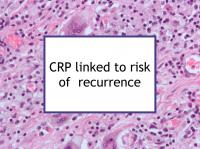C-reactive protein (CRP), which is produced in the liver in response to infection or injury, is a measure of inflammation that can be measured with a blood test. CRP has been reported to be associated with breast cancer outcomes, although studies are inconsistent. Now a new study has linked pre-treatment CRP with risk of recurrence.
Inflammation promotes breast cancer
Systemic inflammation involves the persistent activation of the immune system, resulting in the release of pro-inflammatory signaling molecules (from immune system-related cells) that are used in intercellular communication. Inflammation has been shown to lead to the transformation of normal cells into breast cancer cells through the activation of distorted inflammatory signaling. Systemic inflammation has been shown to promote breast cancer growth, invasion and metastasis.
Increasing the level of physical activity, losing weight if appropriate, avoiding smoking, and effectively treating type 2 diabetes, if present, all can reduce inflammation. Inflammation also can be reduced by eliminating foods that promote inflammation and eating foods that reduce it. Please see our webpage concerning inflammation.
Latest research finds CRP helps predict recurrence
The major Danish study referenced above was designed to evaluate the prognostic value of plasma CRP in early-stage breast cancer. To conduct the study, the authors obtained information concerning 6,942 early-stage breast cancer patients with available pre-treatment CRP from the Danish Breast Cancer Cooperative Group database. Study participants were diagnosed between 2002 and 2016. Recurrence-free interval and survival for up to ten years were assessed.
Analysis was performed for doubling of CRP concentration, as well as for three levels of CRP: < 3 mg/L; 3-10 mg/L, and > 10 mg/L. A doubling of plasma CRP concentration was associated with slightly increased risk of recurrence and shorter survival in multivariate analyses.
Survival was found to be significantly shorter in patients with CRP of 3-10 (multivariate adjusted HR of 1.30) and > 10 (HR of 1.65) compared to < 3 mg/L. The authors conclude that heightened pre-treatment CRP in patients with early-stage breast cancer is an independent marker of increased risk of recurrence and early death. The authors further state that CRP measured before treatment could help inform follow-up of such patients.
